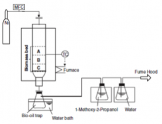The objective of this study was to determine if biochar yield could be increased by the deposition of volatile pyrolysis species within the bed during production, without negatively influencing the microporosity and adsorption properties. Aspen (Populus tremuloides) wood chips were loaded into three vertically stacked zones within a reactor and heated in nitrogen to temperatures between 420 and 650 °C (i.e., pyrolyzed). The yield did increase from the zone at the reactor inlet to the subsequent zones as volatile species deposited and carbonized, and importantly, the carbonized deposits had a similar microporous structure and organic vapor uptake (1,1,1,2-tetrafluoroethane) to that of the primary biochar. Based on these results, bio-oil from previous runs at 600 °C was recycled to the bed, which further increased the yield while maintaining the desirable adsorption properties of the biochar.

